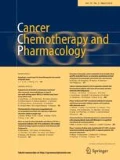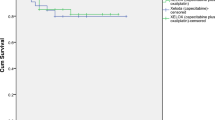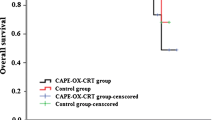Abstract
Purpose
The aim of this study was to evaluate efficacy and safety of chronomodulated capecitabine administered according to a specific time schedule (Brunch Regimen: Breakfast and Lunch) as a part of neoadjuvant chemoradiation therapy in patients with locally advanced rectal cancer.
Methods
Eighty-five patients with stage II and III rectal cancer were included. Patients received capecitabine (1,650 mg/m2 per day; 60 % dose at 8:00 AM and 40 % dose at 12:00 noon) administered during pelvic radiation (total 50.4 Gy in 28 fractions, 1.8 Gy daily dose between 2:00 p.m. and 4:00 p.m.). After chemoradiotherapy, patients underwent surgery. The primary endpoints were pathological complete response (pCR) rate and toxicity.
Results
In 17 patients (20 %), total tumor regression was achieved according to Dworak pathological grading system. Grade III diarrhea occurred in nine patients (10.5 %), while only one patient had grade 3 thrombocytopenia. Grade II or III proctitis were seen in nine (10.5 %) subjects, and grade I or II cystitis in six (6.9 %). Only three patients (3.3 %) developed hand and foot syndrome (both grade I–II). There were no grade IV toxicities.
Conclusions
Brunch Regimen for locally advanced rectal cancer consisting of neoadjuvant chronomodulated capecitabine and concurrent radiation therapy is effective and well tolerated with good safety profile, particularly with regard to the occurrence of hand and foot syndrome, in patients with locally advanced rectal cancer.
Similar content being viewed by others
References
Bosset JF, Collette L, Calais G, Mineur L, Maingon P, Radosevic-Jelic L, Daban A, Bardet E, Beny A, Ollier JC (2006) Chemotherapy with preoperative radiotherapy in rectal cancer. N Engl J Med 355(11):1114–1123. doi:10.1056/NEJMoa060829
Roh MS, Colangelo LH, O’Connell MJ, Yothers G, Deutsch M, Allegra CJ, Kahlenberg MS, Baez-Diaz L, Ursiny CS, Petrelli NJ, Wolmark N (2009) Preoperative multimodality therapy improves disease-free survival in patients with carcinoma of the rectum: NSABP R-03. J Clin Oncol 27(31):5124–5130. doi:10.1200/JCO.2009.22.0467
Valentini V, van Stiphout RG, Lammering G, Gambacorta MA, Barba MC, Bebenek M, Bonnetain F, Bosset JF, Bujko K, Cionini L, Gerard JP, Rodel C, Sainato A, Sauer R, Minsky BD, Collette L, Lambin P (2011) Nomograms for predicting local recurrence, distant metastases, and overall survival for patients with locally advanced rectal cancer on the basis of European randomized clinical trials. J Clin Oncol 29(23):3163–3172. doi:10.1200/JCO.2010.33.1595
Bosset JF, Calais G, Mineur L, Maingon P, Radosevic-Jelic L, Daban A, Bardet E, Beny A, Briffaux A, Collette L (2005) Enhanced tumorocidal effect of chemotherapy with preoperative radiotherapy for rectal cancer: preliminary results—EORTC 22921. J Clin Oncol 23(24):5620–5627. doi:10.1200/JCO.2005.02.113
Schuller J, Cassidy J, Dumont E, Roos B, Durston S, Banken L, Utoh M, Mori K, Weidekamm E, Reigner B (2000) Preferential activation of capecitabine in tumor following oral administration to colorectal cancer patients. Cancer Chemother Pharmacol 45(4):291–297. doi:10.1007/s002800050043
Hofheinz RD, Wenz F, Post S, Matzdorff A, Laechelt S, Hartmann JT, Muller L, Link H, Moehler M, Kettner E, Fritz E, Hieber U, Lindemann HW, Grunewald M, Kremers S, Constantin C, Hipp M, Hartung G, Gencer D, Kienle P, Burkholder I, Hochhaus A (2012) Chemoradiotherapy with capecitabine versus fluorouracil for locally advanced rectal cancer: a randomised, multicentre, non-inferiority, phase 3 trial. Lancet Oncol 13(6):579–588. doi:10.1016/S1470-2045(12)70116-X
Twelves C (2002) Capecitabine as first-line treatment in colorectal cancer. Pooled data from two large, phase III trials. Eur J Cancer 38(Suppl 2):15–20
Capirci C, Valentini V, Cionini L, De Paoli A, Rodel C, Glynne-Jones R, Coco C, Romano M, Mantello G, Palazzi S, Mattia FO, Friso ML, Genovesi D, Vidali C, Gambacorta MA, Buffoli A, Lupattelli M, Favretto MS, La Torre G (2008) Prognostic value of pathologic complete response after neoadjuvant therapy in locally advanced rectal cancer: long-term analysis of 566 ypCR patients. Int J Radiat Oncol Biol Phys 72(1):99–107. doi:10.1016/j.ijrobp.2007.12.019
Levi F (1997) Chronopharmacology of anticancer agents. In: Redfern PH, Lemmer B (eds) Handbook of experimental pharmacology: physiology and pharmacology of biological rhythms. Springer, Berlin, pp 299–331
Levi FA, Zidani R, Vannetzel JM, Perpoint B, Focan C, Faggiuolo R, Chollet P, Garufi C, Itzhaki M, Dogliotti L et al (1994) Chronomodulated versus fixed-infusion-rate delivery of ambulatory chemotherapy with oxaliplatin, fluorouracil, and folinic acid (leucovorin) in patients with colorectal cancer metastases: a randomized multi-institutional trial. J Natl Cancer Inst 86(21):1608–1617
Bajetta E, Pietrantonio F, Buzzoni R, Ferrario E, Valvo F, Mariani L, Dotti KF, Biondani P, Formisano B, Gevorgyan A, Grassi P, Di Bartolomeo M (2013) Chronomodulated capecitabine and adjuvant radiation in intermediate-risk to high-risk rectal cancer: a phase II study. Am J Clin Oncol. doi:10.1097/COC.0b013e31827ecd1d
Hodapp N (2012) The ICRU Report 83: prescribing, recording and reporting photon-beam intensity-modulated radiation therapy (IMRT). Strahlenther Onkol 188(1):97–99. doi:10.1007/s00066-011-0015-x
Saglam S, Bugra D, Saglam EK, Asoglu O, Balik E, Yamaner S, Basaran M, Oral EN, Kizir A, Kapran Y, Gulluoglu M, Sakar B, Bulut T (2014) Fourth versus eighth week surgery after neoadjuvant radiochemotherapy in T3-4/N0+ rectal cancer: Istanbul R-01 study. J Gastrointest Oncol 5(1):9–17. doi:10.3978/j.issn.2078-6891.2013.025
Dworak O, Keilholz L, Hoffmann A (1997) Pathological features of rectal cancer after preoperative radiochemotherapy. Int J Colorectal Dis 12(1):19–23
Dunst J, Debus J, Rudat V, Wulf J, Budach W, Hoelscher T, Reese T, Mose S, Roedel C, Zuehlke H, Hinke A (2008) Neoadjuvant capecitabine combined with standard radiotherapy in patients with locally advanced rectal cancer: mature results of a phase II trial. Strahlenther Onkol 184(9):450–456. doi:10.1007/s00066-008-1751-4
Reigner B, Blesch K, Weidekamm E (2001) Clinical pharmacokinetics of capecitabine. Clin Pharmacokinet 40(2):85–104. doi:10.2165/00003088-200140020-00002
Reigner B, Verweij J, Dirix L, Cassidy J, Twelves C, Allman D, Weidekamm E, Roos B, Banken L, Utoh M, Osterwalder B (1998) Effect of food on the pharmacokinetics of capecitabine and its metabolites following oral administration in cancer patients. Clin Cancer Res 4(4):941–948
Ishikawa T, Sekiguchi F, Fukase Y, Sawada N, Ishitsuka H (1998) Positive correlation between the efficacy of capecitabine and doxifluridine and the ratio of thymidine phosphorylase to dihydropyrimidine dehydrogenase activities in tumors in human cancer xenografts. Cancer Res 58(4):685–690
Walko CM, Lindley C (2005) Capecitabine: a review. Clin Ther 27(1):23–44. doi:10.1016/j.clinthera.2005.01.005
Harris BE, Song RL, He YJ, Soong SJ, Diasio RB (1988) Circadian rhythm of rat liver dihydropyrimidine dehydrogenase. Possible relevance to fluoropyrimidine chemotherapy. Biochem Pharmacol 37(24):4759–4762
Mani S, Hochster H, Beck T, Chevlen EM, O’Rourke MA, Weaver CH, Bell WN, White R, McGuirt C, Levin J, Hohneker J, Schilsky RL, Lokich J (2000) Multicenter phase II study to evaluate a 28-day regimen of oral fluorouracil plus eniluracil in the treatment of patients with previously untreated metastatic colorectal cancer. J Clin Oncol 18(15):2894–2901
Schilsky RL, Hohneker J, Ratain MJ, Janisch L, Smetzer L, Lucas VS, Khor SP, Diasio R, Von Hoff DD, Burris HA III (1998) Phase I clinical and pharmacologic study of eniluracil plus fluorouracil in patients with advanced cancer. J Clin Oncol 16(4):1450–1457
Lokich JJ, Moore C (1984) Chemotherapy-associated palmar-plantar erythrodysesthesia syndrome. Ann Intern Med 101(6):798–799
Macedo LT, Lima JP, Dos Santos LV, Sasse AD (2014) Prevention strategies for chemotherapy-induced hand–foot syndrome: a systematic review and meta-analysis of prospective randomised trials. Support Care Cancer. doi:10.1007/s00520-014-2129-z
Brown WR (1991) A review and mathematical analysis of circadian rhythms in cell proliferation in mouse, rat, and human epidermis. J Invest Dermatol 97(2):273–280
Santini D, Vincenzi B, Schiavon G, Di Seri M, Virzi V, Spalletta B, Caricato M, Coppola R, Tonini G (2007) Chronomodulated administration of oxaliplatin plus capecitabine (XELOX) as first line chemotherapy in advanced colorectal cancer patients: phase II study. Cancer Chemother Pharmacol 59(5):613–620. doi:10.1007/s00280-006-0302-x
Qvortrup C, Jensen BV, Fokstuen T, Nielsen SE, Keldsen N, Glimelius B, Bjerregaard B, Mejer J, Larsen FO, Pfeiffer P (2010) A randomized study comparing short-time infusion of oxaliplatin in combination with capecitabine XELOX(30) and chronomodulated XELOX(30) as first-line therapy in patients with advanced colorectal cancer. Ann Oncol 21(1):87–91. doi:10.1093/annonc/mdp272
Levi F, Zidani R, Misset JL (1997) Randomised multicentre trial of chronotherapy with oxaliplatin, fluorouracil, and folinic acid in metastatic colorectal cancer. Int Organ Cancer Chronother Lancet 350(9079):681–686
Chua YJ, Barbachano Y, Cunningham D, Oates JR, Brown G, Wotherspoon A, Tait D, Massey A, Tebbutt NC, Chau I (2010) Neoadjuvant capecitabine and oxaliplatin before chemoradiotherapy and total mesorectal excision in MRI-defined poor-risk rectal cancer: a phase 2 trial. Lancet Oncol 11(3):241–248. doi:10.1016/S1470-2045(09)70381-X
Nagtegaal ID, Quirke P (2008) What is the role for the circumferential margin in the modern treatment of rectal cancer? J Clin Oncol 26(2):303–312. doi:10.1200/JCO.2007.12.7027
De Paoli A, Chiara S, Luppi G, Friso ML, Beretta GD, Del Prete S, Pasetto L, Santantonio M, Sarti E, Mantello G, Innocente R, Frustaci S, Corvo R, Rosso R (2006) Capecitabine in combination with preoperative radiation therapy in locally advanced, resectable, rectal cancer: a multicentric phase II study. Ann Oncol 17(2):246–251. doi:10.1093/annonc/mdj041
Dupuis O, Vie B, Lledo G, Hennequin C, Noirclerc M, Bennamoun M, Jacob JH (2007) Preoperative treatment combining capecitabine with radiation therapy in rectal cancer: a GERCOR phase II study. Oncology 73(3–4):169–176. doi:10.1159/000127383
Park IJ, You YN, Agarwal A, Skibber JM, Rodriguez-Bigas MA, Eng C, Feig BW, Das P, Krishnan S, Crane CH, Hu CY, Chang GJ (2012) Neoadjuvant treatment response as an early response indicator for patients with rectal cancer. J Clin Oncol 30(15):1770–1776. doi:10.1200/JCO.2011.39.7901
Author information
Authors and Affiliations
Corresponding author
Rights and permissions
About this article
Cite this article
Akgun, Z., Saglam, S., Yucel, S. et al. Neoadjuvant chronomodulated capecitabine with radiotherapy in rectal cancer: a phase II brunch regimen study. Cancer Chemother Pharmacol 74, 751–756 (2014). https://doi.org/10.1007/s00280-014-2558-x
Received:
Accepted:
Published:
Issue Date:
DOI: https://doi.org/10.1007/s00280-014-2558-x




